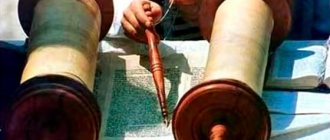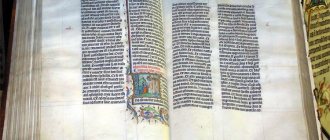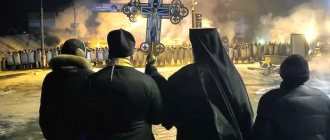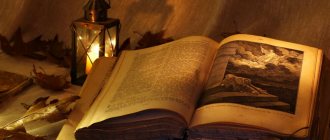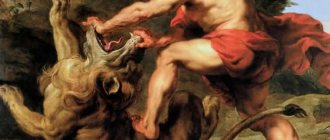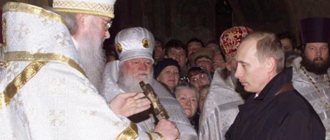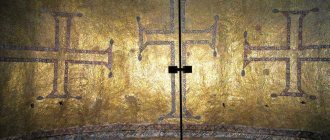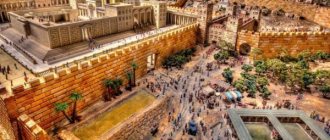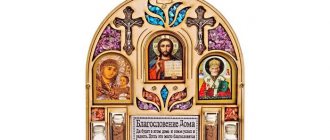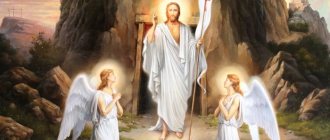Patriarch Jacob (Israel)
Jacob's fight with the Angel. Vysoki Decani Monastery, Serbia
Esau hated Jacob and after his father's death wanted to kill him. Fearing for her son, Rebekah advises Isaac to send Jacob to Mesopotamia to take a wife . Isaac gives his blessing to choose one of the daughters of Laban, Rebekah's brother, as his wife. Having received the blessing, Jacob goes to Mesopotamia. He left Bathsheba. He had a long and difficult journey ahead of him. First it was necessary to go north along Canaan, then through Jordan, Gilead, Bashan; go towards Damascus and further to Harran, where Laban lived. Saint John Chrysostom emphasizes the virtues of Jacob: “Now look at this young man, brought up at home, who has never experienced the difficulties of traveling, nor living on a foreign side, nor any other worries - learn how he makes the journey, and learn high wisdom.” (Conversations on the book of Genesis. 54. 3).
Night found him near the city of Luz. Jacob put a stone under his head and lay down to spend the night. He had a wonderful vision that had a high prophetic meaning. He saw in a dream a ladder from earth to heaven . Angels of God ascended and descended on it. Jacob saw the Lord on the stairs, who said: The land on which you lie I will give to you and to your descendants; and your descendants will be like the sand of the earth; and you will spread to the sea, and to the east, and to the north, and to the noonday; and in you and in your seed all families of the earth will be blessed; and behold, I am with you, and I will keep you wherever you go; and I will bring you back to this land, for I will not leave you until I have fulfilled what I have spoken to you (Gen. 28:13-15).
The staircase from earth to heaven was an expression of the close connection between the heavenly and the earthly. The ascent and descent of Angels along it means that they offer prayers to God for people, intercede for them and bring down God’s mercies to people.
Jacob's Ladder. Monastery of Dionysiates, Athos
This passage from the book of Genesis is read as a proverb on the feasts of the Mother of God. Jacob's Ladder is the connection between Heaven and earth, man and God. The most perfect example of such a union was revealed by the Most Pure Virgin Mary . She herself became the ladder that leads to God. Most of the Old Testament prophetic revelations have both a universal, messianic meaning and a proximate one (within the framework of Old Testament history). Jacob's vision also had a specific goal: to strengthen the righteous in the difficult task of participating in the plans of the Divine economy. Patriarch Jacob did not yet know what trials awaited him. The Lord strengthens his faith in advance with His promises and promises protection. Jacob called this place Bethel (Heb. Beth-El - the house of God).
Jacob was greeted with joy by his uncle Laban. He settled in his house and began to work. Having fallen in love with his youngest daughter Rachel , who was beautiful in figure and beautiful in face (Genesis 29:17), he could not immediately ask for her hand, since in the East it is the groom (and not the bride’s parents) who must give the ransom to the bride’s parents. Jacob was a stranger and had nothing. He offered seven years of his labor for Rachel. When they had passed, they seemed to Jacob like several days. So he fell in love with Rachel. Laban arranged a wedding feast, and in the evening he brought Leah into his chambers. Apparently there was complete darkness, because it was only in the morning that Jacob learned that it was Leah. To make amends, Laban offered to finish the wedding week of days, and then take Rachel as his wife, but for this it was necessary to work for another seven years.
Each of them had their own reasons for suffering. Rachel was loved, but barren. Leah could give birth, but her husband did not love her. The Lord looked upon Leah and gave her children. Reuben was born first. He became one of the twelve patriarchs of Israel, from whom twelve tribes were formed. The firstborn undoubtedly had a good dispensation of soul. He prevented the brothers from killing Joseph. Later, when Jacob refused to let his beloved son Benjamin go with his brothers to Egypt, Reuben offered his four sons instead.
The second Leah gave birth to Simeon. Jacob's third son by Leah was Levi . The tribe that descended from this patriarch occupies a special place in Sacred history: it did not receive its inheritance in the Promised Land, but was placed in the service of God. High priests, priests and Levites were supplied from it . The fourth Leah gave birth to Judah . He also showed compassion for Joseph, offering not to kill him, but to sell him. During his second trip to Egypt, he offered himself as a slave to Joseph for Benjamin, whom he wanted to keep with him (Gen. 44: 16-34). By the providence of God, this particular tribe was chosen for the special purposes of the Divine economy: from it came the Messiah, Christ the Savior of the world . Dan was born fifth. His descendants were judges and warriors.
The patriarch Jacob already had ten sons when God looked upon Rachel: God heard her and opened her womb (Genesis 30:22). She gave birth to a son, whom she named Joseph (“adding, giving more”). Divine Providence assigned this patriarch a special place in the destinies of Israel. Sold into slavery in Egypt and going through suffering, he saved the chosen people from death during a terrible famine. Many circumstances in the life of Patriarch Joseph prefigure the events of the earthly life of Jesus Christ .
The second seven-year term of the agreement between Laban and Jacob has ended. But Laban, seeing that God’s blessing that was on Jacob had come to his house, did not want to let him go. Another six years passed. It was hard for Jacob. Laban was very unhappy that his worker was becoming richer than him. The Lord commanded Jacob to return to his homeland and promised: I will be with you (Genesis 31:3).
When Laban left home to shear livestock, Jacob, having received the consent of Leah and Rachel, left Haran with his entire large family, livestock and wealth. Only on the third day did Laban learn about his son-in-law’s departure and begin the pursuit. Seven days later he caught up with the caravan in Gilead, in Transjordan. Protecting the integrity of His chosen one, God appeared to Laban and warned him against violence against Jacob. Laban and Jacob entered into an alliance and erected a monument of stones as evidence of the agreement. When Jacob set out on his further journey to his father's house, the Lord strengthened him. And the Angels of God met him. When Jacob saw them, he said, “This is the army of God.” And he called the name of that place Mahanaim (Genesis 32:1-2), which translated from Hebrew means double camp. It is easy to understand the purpose of this revelation from God. Jacob, escaping Laban's persecution, feared the one whose anger had forced him to leave his father's house twenty years earlier.
When Jacob learned that Esau, having four hundred men, was coming to meet him, he divided the camp in two so that at least one of them could be saved. He turned to God with a humble prayer . He said that he was unworthy of all mercy and blessings, but asked to protect him and his entire family. Prayer calmed him. He canceled his previous decision to flee and went to meet Esau, sending ahead rich gifts - cattle. When they approached the Jabbok River, which flows into the Jordan from the east, Jacob forded his family, and he himself was left alone. As the exegetes explain - for prayer. And as the Holy Scripture says, Someone appeared to him and fought with him until dawn. This is one of the most mysterious places in the biblical books. The night event has been the subject of interpretation and study by many exegetes. “From the whole story,” writes Blessed Theodoret, “we know that here God’s Only Begotten Son God .”
Although this struggle was also a test of Jacob's physical strength, it undoubtedly has a spiritual meaning. “Showing Jacob how long they had been fighting, the Angel added: the dawn has broken. And Jacob asked Him for blessing, teaching that they fought each other out of love; and the Angel blessed Jacob, showing by this that he was not angry with the one who opposed Him, being a man of earth” (Rev. Ephraim the Syrian). He who fought with Jacob touched the patriarch’s thigh and injured it: from now on your name will not be Jacob, but Israel, for you have fought with God, and you will overcome men (Gen. 32:28). The new name of Jacob - Israel passed on to all of God's chosen people and became an ethnonym. One possible translation: “God fights.”
On the way to the land of Canaan, near Bethlehem, Rachel died during childbirth. She named her son Benoni (“son of my sorrow”). However, Jacob, not wanting the name to constantly remind of this sad event, named his son Benjamin (“son of the right hand, son of happiness”).
Before Jacob, in each generation only one member of the family was the heir of the promise. The rest (brothers and their descendants) were separated from the central hereditary branch. Starting with Jacob, all the descendants of the patriarchs are part of God's chosen people: the twelve sons of Jacob, their children and all their descendants.
Origin of the Apostle James
The Apostle James came from a poor fisherman's family, the son of Zebedee, who lived and worked in Galilee, and who had another son, the younger brother of the Apostle James, John the Theologian.
He was called by Jesus Christ while fishing on Lake Gennesaret, along with his other two brothers Andrew and Peter, who became the first disciples of Christ.
The Apostle James was one of Christ's closest disciples and a witness to several special events during His life , such as the Transfiguration of Christ on Mount Tabor, His Resurrection, as well as the Appearance of Christ to the disciples after His resurrection on the Tiberias River.
Discovery of the tomb of the Apostle James
Legend has it that many years later, a hermit in the area of Pelayo, one day, seeing a collection of stars moving in the sky, hypnotized by their brilliance and beauty, followed them, after some time, entering the forest, he discovered a marble tomb with a small altar with her.
Impressed by the discovery, he ran to inform the authorities about it. The news reached King Alfonso II himself , who immediately went to the place to personally verify that these were the remains of the Apostle James. From that moment on, he named Santiago the patron saint of Spain and ordered the construction of a church in his honor on the same site. Hence the name of that area, Compostela (Compostela) - campus stellae - Path of the Stars.
This event became historically important for Spain, thanks to it, the famous Great Military Order of Santiago (Orden de Santiago) , which was entrusted with the protection of pilgrims wishing to go to Compostela to honor the memory of St. James the Apostle.
After the death of Christ
The Apostle James or Santiago, as he is called in Spain, after the resurrection of Christ, went to preach in the lands of Galletia, present-day Galicia in Spain.
The lands of Galicia are the only place where the Apostle visited during his life and where he “returned” after his death.
After his preaching in the lands on the Ulia River, he returned to Jerusalem, where in 44 he was executed by order of Emperor Herod Agrippa. Saint James became the first apostle to die for the Christian faith.
After the death of Saint James, the other apostles, having received the emperor's refusal to bury him, decided to flee with the body of the Apostle back to Galicia , where in the land of Iria Flavia in the forest of Liberum Donum, they decide to build a tomb to hide the body Apostle James. Thus a legend was born and the beginning of the pilgrimage was laid.
Beginning of the pilgrimage
From that moment on, thousands of Christians from all over the world decided to follow the roads of the ancient Roman Empire to honor the Apostle at the place of his eternal rest.
The current controversy regarding the authenticity of the remains of the Apostle James kept in the Cathedral of Santiago is based on the fact that they had to be moved several times. One of the reasons was the threat of pirates in the 16th century , who at that time tried to land in the city of La Coruña.
Due to fears of destruction or desecration of the Apostle's tomb, it was decided to build a small structure at the rear of the main altar where the remains of Saint James were hidden , and where they were kept until their rediscovery in 1884.
